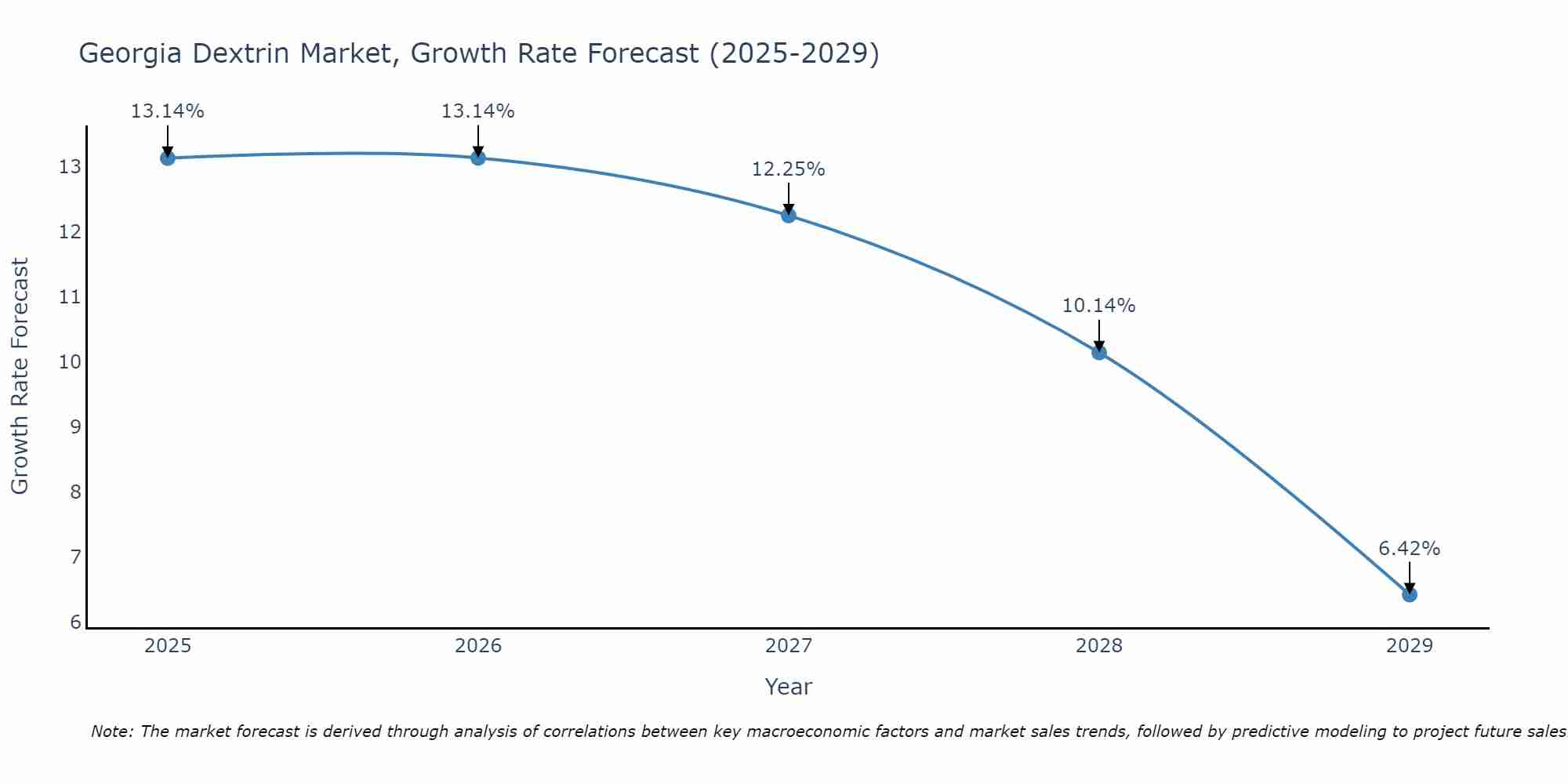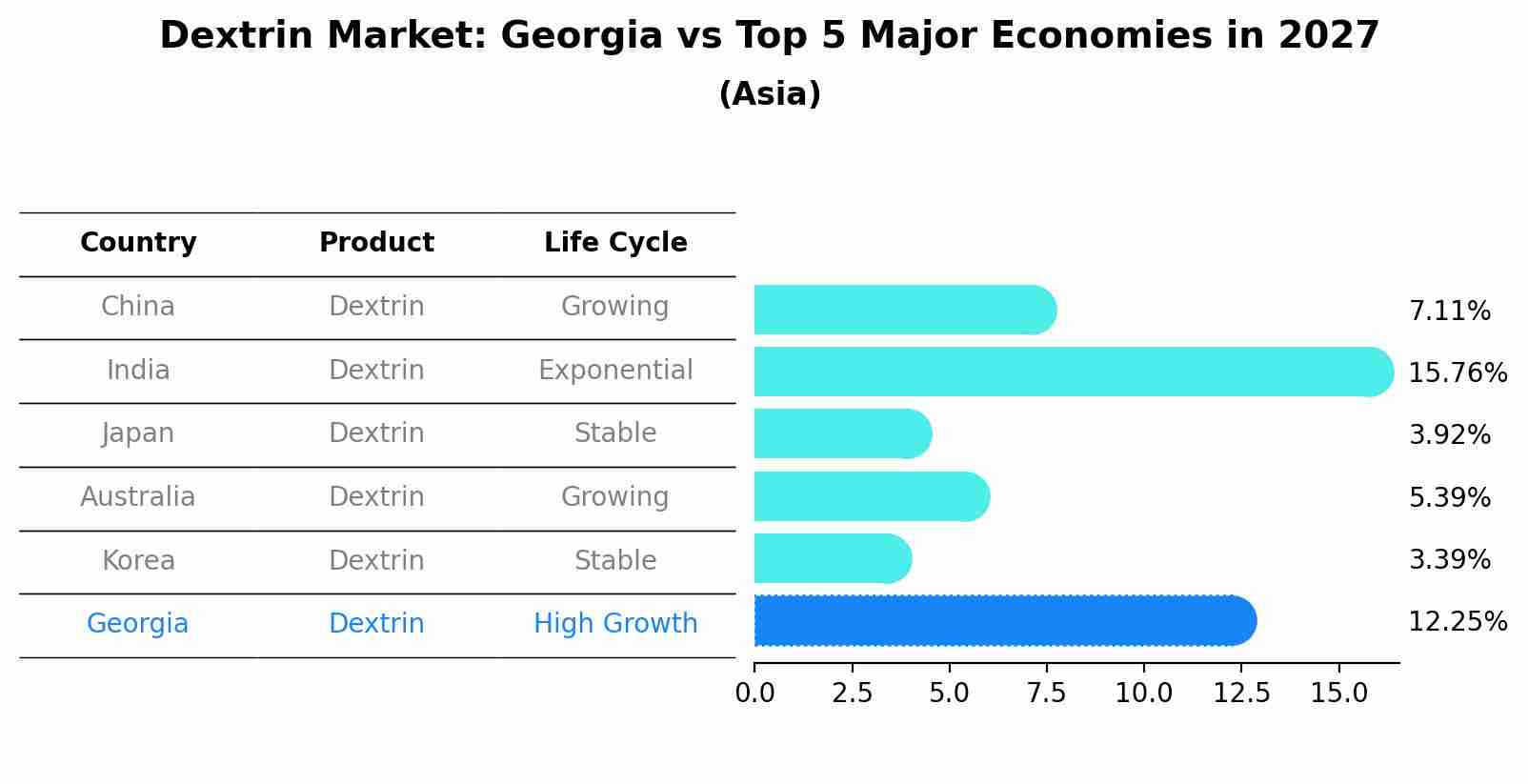Georgia Dextrin Market (2025-2031) Outlook | Companies, Forecast, Analysis, Revenue, Share, Growth, Value, Industry, Size & Trends
| Product Code: ETC094039 | Publication Date: Jun 2021 | Updated Date: Apr 2025 | Product Type: Report | |
| Publisher: 6Wresearch | Author: Ravi Bhandari | No. of Pages: 70 | No. of Figures: 35 | No. of Tables: 5 |
Georgia Dextrin Market Size Growth Rate
The Georgia Dextrin Market is projected to witness mixed growth rate patterns during 2025 to 2029. The growth rate begins at 13.14% in 2025, climbs to a high of 13.14% in 2026, and moderates to 6.42% by 2029.

Dextrin Market: Georgia vs Top 5 Major Economies in 2027 (Asia)
By 2027, the Dextrin market in Georgia is anticipated to reach a growth rate of 12.25%, as part of an increasingly competitive Asia region, where China remains at the forefront, supported by India, Japan, Australia and South Korea, driving innovations and market adoption across sectors.

Georgia Dextrin Market Overview
The dextrin market in Georgia is witnessing steady growth, driven by its widespread applications across various industries, including food and beverage, pharmaceuticals, textiles, and adhesives. Dextrin, a carbohydrate polymer derived from starch, serves as a versatile ingredient and functional additive in food products such as baked goods, confectionery, and beverages, providing texture, stability, and mouthfeel. In the pharmaceutical industry, dextrin is utilized as an excipient in drug formulations, while in textiles, it serves as a sizing agent and binder in fabric production. Moreover, the growing demand for natural and clean label ingredients is fueling market expansion in Georgia, as dextrin is perceived as a healthier alternative to synthetic additives. Additionally, advancements in dextrin processing technologies and the introduction of specialty dextrin derivatives are driving market competition and innovation.
Drivers of the market
The increasing demand for dextrin in food and beverage, pharmaceutical, and industrial applications is driving the growth of the dextrin market in Georgia. Dextrin is widely used as a thickening agent, stabilizer, and texturizer in various products, thus fueling its adoption across industries.
Challenges of the market
In the Georgia Dextrin Market, challenges include raw material sourcing, product differentiation, and market volatility. Securing a consistent and cost-effective supply of raw materials for dextrin production while ensuring quality and sustainability can be challenging. Moreover, differentiating dextrin products in a competitive market landscape and meeting diverse customer requirements across industries require continuous innovation and customization. Additionally, navigating market fluctuations driven by factors such as changing consumer preferences and economic conditions poses challenges for manufacturers and suppliers.
Government Policy of the market
In Georgia, the government has implemented various policies to regulate and support the dextrin market, ensuring the safety, quality, and sustainability of dextrin products used in food, pharmaceuticals, and industrial applications. Regulatory agencies such as the Georgia Department of Agriculture oversee the production, processing, and labeling of dextrin, ensuring compliance with state and federal standards for food safety, purity, and labeling. Additionally, the government may provide technical assistance and research funding to support innovation and quality improvement within the dextrin industry, fostering the development of new production methods, product formulations, and applications. Furthermore, the Georgia Department of Economic Development may promote Georgia as a center for dextrin manufacturing and research, attracting investment and talent to the state and stimulating economic growth and job creation in the food and chemical sectors. Overall, these policies aim to promote the responsible and sustainable development of the dextrin market in Georgia, balancing economic opportunities with environmental stewardship and consumer protection.
Key Highlights of the Report:
- Georgia Dextrin Market Outlook
- Market Size of Georgia Dextrin Market, 2024
- Forecast of Georgia Dextrin Market, 2031
- Historical Data and Forecast of Georgia Dextrin Revenues & Volume for the Period 2021-2031
- Georgia Dextrin Market Trend Evolution
- Georgia Dextrin Market Drivers and Challenges
- Georgia Dextrin Price Trends
- Georgia Dextrin Porter's Five Forces
- Georgia Dextrin Industry Life Cycle
- Historical Data and Forecast of Georgia Dextrin Market Revenues & Volume By Powder Form for the Period 2021-2031
- Historical Data and Forecast of Georgia Dextrin Market Revenues & Volume By Yellow for the Period 2021-2031
- Historical Data and Forecast of Georgia Dextrin Market Revenues & Volume By White for the Period 2021-2031
- Historical Data and Forecast of Georgia Dextrin Market Revenues & Volume By Brown for the Period 2021-2031
- Historical Data and Forecast of Georgia Dextrin Market Revenues & Volume By Type for the Period 2021-2031
- Historical Data and Forecast of Georgia Dextrin Market Revenues & Volume By Limit dextrin for the Period 2021-2031
- Historical Data and Forecast of Georgia Dextrin Market Revenues & Volume By Maltodextrin for the Period 2021-2031
- Historical Data and Forecast of Georgia Dextrin Market Revenues & Volume By Cyclodextrin for the Period 2021-2031
- Historical Data and Forecast of Georgia Dextrin Market Revenues & Volume By Amylodextrin for the Period 2021-2031
- Historical Data and Forecast of Georgia Dextrin Market Revenues & Volume By End-use Industries for the Period 2021-2031
- Historical Data and Forecast of Georgia Dextrin Market Revenues & Volume By Pharmaceutical for the Period 2021-2031
- Historical Data and Forecast of Georgia Dextrin Market Revenues & Volume By Cosmetics for the Period 2021-2031
- Historical Data and Forecast of Georgia Dextrin Market Revenues & Volume By Food for the Period 2021-2031
- Historical Data and Forecast of Georgia Dextrin Market Revenues & Volume By Paper for the Period 2021-2031
- Georgia Dextrin Import Export Trade Statistics
- Market Opportunity Assessment By Powder Form
- Market Opportunity Assessment By Type
- Market Opportunity Assessment By End-use Industries
- Georgia Dextrin Top Companies Market Share
- Georgia Dextrin Competitive Benchmarking By Technical and Operational Parameters
- Georgia Dextrin Company Profiles
- Georgia Dextrin Key Strategic Recommendations
Frequently Asked Questions About the Market Study (FAQs):
Export potential assessment - trade Analytics for 2030
Export potential enables firms to identify high-growth global markets with greater confidence by combining advanced trade intelligence with a structured quantitative methodology. The framework analyzes emerging demand trends and country-level import patterns while integrating macroeconomic and trade datasets such as GDP and population forecasts, bilateral import–export flows, tariff structures, elasticity differentials between developed and developing economies, geographic distance, and import demand projections. Using weighted trade values from 2020–2024 as the base period to project country-to-country export potential for 2030, these inputs are operationalized through calculated drivers such as gravity model parameters, tariff impact factors, and projected GDP per-capita growth. Through an analysis of hidden potentials, demand hotspots, and market conditions that are most favorable to success, this method enables firms to focus on target countries, maximize returns, and global expansion with data, backed by accuracy.
By factoring in the projected importer demand gap that is currently unmet and could be potential opportunity, it identifies the potential for the Exporter (Country) among 190 countries, against the general trade analysis, which identifies the biggest importer or exporter.
To discover high-growth global markets and optimize your business strategy:
Click Here- Single User License$ 1,995
- Department License$ 2,400
- Site License$ 3,120
- Global License$ 3,795
Search
Thought Leadership and Analyst Meet
Our Clients
Related Reports
- India Switchgear Market Outlook (2026 - 2032) | Size, Share, Trends, Growth, Revenue, Forecast, Analysis, Value, Outlook
- Pakistan Contraceptive Implants Market (2025-2031) | Demand, Growth, Size, Share, Industry, Pricing Analysis, Competitive, Strategic Insights, Strategy, Consumer Insights, Analysis, Investment Trends, Opportunities, Revenue, Segments, Value, Segmentation, Supply, Forecast, Restraints, Outlook, Competition, Drivers, Trends, Companies, Challenges
- Sri Lanka Packaging Market (2026-2032) | Outlook, Competition, Drivers, Trends, Demand, Pricing Analysis, Competitive, Strategic Insights, Companies, Challenges, Strategy, Consumer Insights, Analysis, Investment Trends, Opportunities, Growth, Size, Share, Industry, Revenue, Segments, Value, Segmentation, Supply, Forecast, Restraints
- India Kids Watches Market (2026-2032) | Strategy, Consumer Insights, Analysis, Investment Trends, Opportunities, Growth, Size, Share, Industry, Revenue, Segments, Value, Segmentation, Supply, Forecast, Restraints, Outlook, Competition, Drivers, Trends, Demand, Pricing Analysis, Competitive, Strategic Insights, Companies, Challenges
- Saudi Arabia Core Assurance Service Market (2025-2031) | Strategy, Consumer Insights, Analysis, Investment Trends, Opportunities, Growth, Size, Share, Industry, Revenue, Segments, Value, Segmentation, Supply, Forecast, Restraints, Outlook, Competition, Drivers, Trends, Demand, Pricing Analysis, Competitive, Strategic Insights, Companies, Challenges
- Romania Uninterruptible Power Supply (UPS) Market (2026-2032) | Industry, Analysis, Revenue, Size, Forecast, Outlook, Value, Trends, Share, Growth & Companies
- Saudi Arabia Car Window Tinting Film, Paint Protection Film (PPF), and Ceramic Coating Market (2025-2031) | Strategy, Consumer Insights, Analysis, Investment Trends, Opportunities, Growth, Size, Share, Industry, Revenue, Segments, Value, Segmentation, Supply, Forecast, Restraints, Outlook, Competition, Drivers, Trends, Demand, Pricing Analysis, Competitive, Strategic Insights, Companies, Challenges
- South Africa Stationery Market (2025-2031) | Share, Size, Industry, Value, Growth, Revenue, Analysis, Trends, Segmentation & Outlook
- Afghanistan Rocking Chairs And Adirondack Chairs Market (2026-2032) | Size & Revenue, Competitive Landscape, Share, Segmentation, Industry, Value, Outlook, Analysis, Trends, Growth, Forecast, Companies
- Afghanistan Apparel Market (2026-2032) | Growth, Outlook, Industry, Segmentation, Forecast, Size, Companies, Trends, Value, Share, Analysis & Revenue
Industry Events and Analyst Meet
Whitepaper
- Middle East & Africa Commercial Security Market Click here to view more.
- Middle East & Africa Fire Safety Systems & Equipment Market Click here to view more.
- GCC Drone Market Click here to view more.
- Middle East Lighting Fixture Market Click here to view more.
- GCC Physical & Perimeter Security Market Click here to view more.
6WResearch In News
- Doha a strategic location for EV manufacturing hub: IPA Qatar
- Demand for luxury TVs surging in the GCC, says Samsung
- Empowering Growth: The Thriving Journey of Bangladesh’s Cable Industry
- Demand for luxury TVs surging in the GCC, says Samsung
- Video call with a traditional healer? Once unthinkable, it’s now common in South Africa
- Intelligent Buildings To Smooth GCC’s Path To Net Zero


















